1915 year. "And let the Poles choose between us and the Germans"
The operational measures for the formation of Polish units almost coincided with the remarkably loyal to Poland and the Poles speech by Prime Minister Goremykin, an inveterate conservative and Russophile. What was it? The last "goodbye" or agitation, before it's too late? But of course, it was not about creating the Polish army, just under the gun were ready to put everyone you can. However, the results of great organizational work were truly deplorable. It was all to no avail, not least because it was useless: there was no longer any real opportunity to carry out kits on Polish lands.
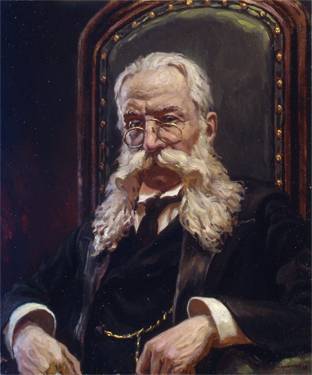
Ivan Logginovich Goremykin, perhaps the most loyal subject of the last prime ministers of the empire
And in August 1915, three Polish members of the State Council sent to their colleagues, members of the State Council and deputies of the State Duma, an extensive note on urgent measures to change the position of Poles in Russia. Among other things, it raised the issue of land tenure, which hung for Poland from 1865 on, on restrictions on state and military service, on religious issues, on language ... Very timely, isn't it?
July 23 under Art. Art. (5 August) 1915, the Russians left Warsaw. Immediately after the fall of the capital of the Kingdom of Poland, the State Duma extended the powers of members of the Duma and the State Council elected from the Polish provinces for the period until the liberation of the Polish lands. But it was no longer possible to disregard the fact that the situation in the Polish question had already fundamentally changed.
Kudashev, who represented Russian diplomacy at the headquarters, wrote to 7 of August (25 July, Art. 1915) to the Minister of Foreign Affairs: “... Regarding our leaving Warsaw and a possible turn of the Poles' mood, General Yanushkevich told me:“ Statement by I.L. Goremykin about the autonomy of Poland was made very timely. Now let the Poles choose between us and the Germans. If it turns out that they prefer the latter, then this will save us from all our promises to them, the present and former. This remark affects, I think, the true, unfriendly attitude of the general towards the Poles and disagreement with any concessions to their political aspirations ”(1).
Yes, mobilization in the Polish lands was no worse than throughout Russia. But it was not the patriotism of the masses that worked more, but the fact that the Polish peasant had far less chance of evading conscription. The Poles, moreover, still had much more opportunities not to get up under the gun - starting with the right of the "last breadwinner" and ending with a considerable number of cases of commission from the supply of healers. The fact is that among the doctors there were many not only Poles, who saved the Germans not without risk, but also the Germans. The latter, without hiding sympathy for Germany and Austria - the enemies of Russia, were honored for the duty not to give the Russian Tsar one-another "extra" soldier.
But what kind of soldiers in the Russian army were the Poles, whom Napoleon himself considered excellent fighters? We admit, far from the best. A textbook study of Lieutenant-General, Professor of the Academy of the General Staff N.N. Golovina (2) testified: the ratio of the losses of “bloody” and prisoners to soldiers called up from Great Russian and Polish provinces is strikingly different - 60 on 40, and then 70 on 30 percent from “Great Russians” against 40 to 60 from “Poles”. Leave this data without quite appropriate comments here. However, it must be remembered that the Polish soldiers also "bravo" fought in the ranks of the Austrian and German army.
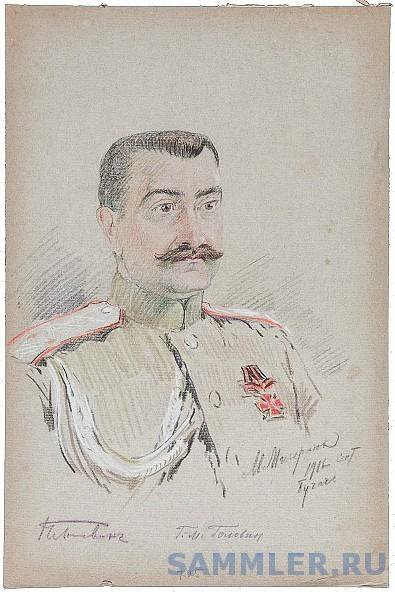
General N.N. Golovin, undisputed authority on stories The First World War
The "legions" of shooters, and the Polish brigades formed later in France - do not count. But it’s easy to judge how the Poles could fight in the "national" Polish armed forces, at least by the results of the Soviet-Polish war of the 1920 of the year. But after all, the red regiments near Warsaw also fought desperately, and a high percentage of prisoners in the troops of M. Tukhachevsky gave only the brilliant maneuver of General M. Weigan and J. Pilsudski from Wepsch, who overturned the ambitious plans of the red Bonaparte. And the tragic fate of these prisoners, which, unlike the constantly “unwinding” drama of Katyn, few people remember is generally a topic for a separate military historical research.
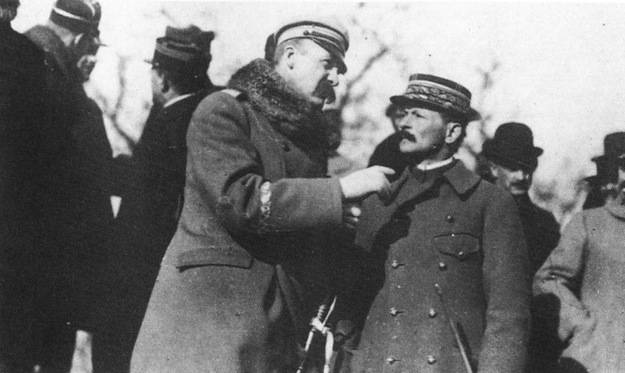
Jozef Pilsudski on positions with French General Maxim Weygand
The occupation of Austro-Germans in Russian Poland did not bring her any good. First of all, the new owners of the Kingdom were simply unable to provide the supply of major Polish cities with food at least at the same level as before the invasion, not to mention the pre-war conditions. Worse, from the first days of the occupation, large-scale export of not only industrial products but also materials and equipment, and for the most part not military purposes, began from the Polish territories to the inner regions of the two empires.
From the telegram of the ambassador in London, A. K. Benckendorf to the Minister of Foreign Affairs from February 23 / March 7 in March 1916:
Another “gift” for pro-German Poles turned out to be a sharp aggravation of the contradictions between Germany and Austria. Vienna was in a hurry to appoint the governor for the occupied territories, but the operational Germans outstripped an ally - and Chancellor Berchtold was forced to implore the allies to immediately declare that there were no annexationist aspirations. Berlin was preparing the creation of an independent, and in fact puppet Poland, which not only breaks away from Russia, but also grabs Galicia from the Hapsburgs. Even surviving from his mind Franz Joseph exploded, and demanded clarification from William. Obviously, this quarrel later became key when creating a bastard regency in Russian Poland.
The fact is indisputable that already later, Austria, under the impression of Brusilovsky’s defeat, immediately went for the most significant indulgences to the Poles, both in the occupied lands and within the country. Nevertheless, the very fact of the completely inconsistent evolution of the policy of invaders in the Polish lands is very indicative. The bureaucracy of the Habsburg monarchy, in whose possessions the Poles, perhaps, experienced the least oppression, for the sake of their own salvation again did not oppose the transformation of a patchwork empire from a two-in-one to a triune one.
The stubborn Serbia fought to the death against such a prospect, so why not justify the third throne in conquered Warsaw, or, at worst, in the “royal” Krakow? It is possible, therefore, to give some more indulgences to future subjects. The Poles, unlike the other Slavs of the empire, did not like the Russians (and still mostly did not like them - AP), they were (and remain) Catholics and could be a good support for the Habsburg swinging throne along with the Magyars.
About these measures of Vienna wrote 16 June 1916, General A.A. Brusilov to the newly appointed Chief of Staff of the Supreme Commander M.V. Alekseev:
In turn, Germany, in the hope of a separate peace with Russia, at first did not weaken the grip of the occupation regime. The kingdom of Poland was divided into two zones - the Austrian and Germanic ones, of which the Lublin and Warsaw governors were created. Despite the allied relations, movement between them was forbidden, the most severe passport regime was introduced, numerous requisitions were carried out, and raw materials and equipment were transported to the Central Powers.
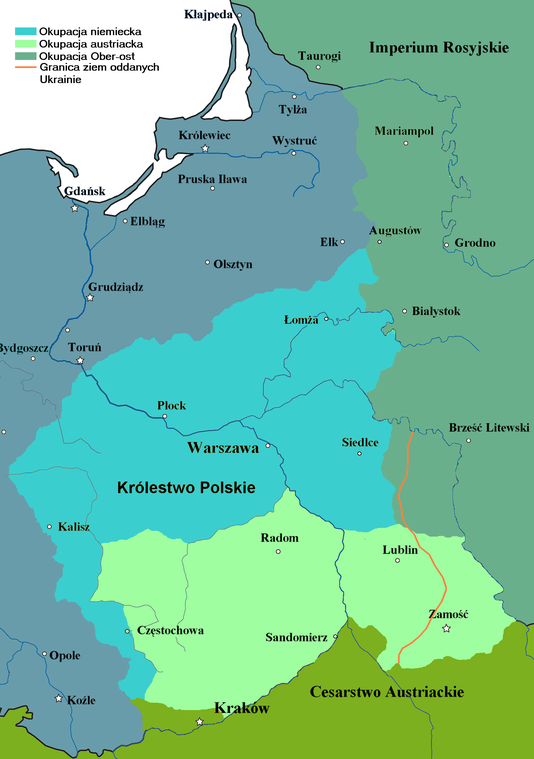
Germany and Austria-Hungary did not hesitate with the section "Russian Poland"
The Russian Foreign Ministry had a good idea of the political consequences of the German occupation of the Kingdom. And, admittedly, very thoroughly prepared ahead of time. Significant in this sense is the letter to the Foreign Ministry from 29 / 16 in January 1916 of the Russian Ambassador to Paris Izvolsky. Long before the German-Austrian Declaration on Poland, he reported that a certain Svatkovsky, a representative of the PTA, acquainted the ambassador in Paris with the German-Austrian plans against Russia on the basis of the Polish question. Svatkovsky considered it necessary to take preemptive measures, for example - confirmation by the Powers of Power of the desirability of the unification of Poland.
Moreover, in order not to waste time, Russia could fulfill this task, repeating, in more definite terms, the appeal of the Grand Duke Commander-in-Chief, with a clearer indication of future boundaries and features of the Polish state system (of course, only the autonomy’s features were openly mentioned). The Consent Powers could then congratulate Russia on its generous decision, which would make a huge impression on the Polish world.
Izvolsky considered it his duty to remind the Foreign Ministry that Russia cannot be indifferent to how the public opinion of the Consent Powers will react to the solution of the most important issues for it, to which the ambassador attributed questions about the straits and the Polish. He himself added that the French public is prone in both matters to go the wrong way, which can cause misunderstandings between Russia and France.
Izvolsky's position was quite simple - it was necessary to wrest the initiative not only from the hands of the Germans, but also from the allies. The former minister frankly ignored the intentions of the current minister to internationalize the Polish question. For this, Sazonov was rewarded for this by the Empress Alexandra Feodorovna herself, who did not call him anything other than “this cattle”.
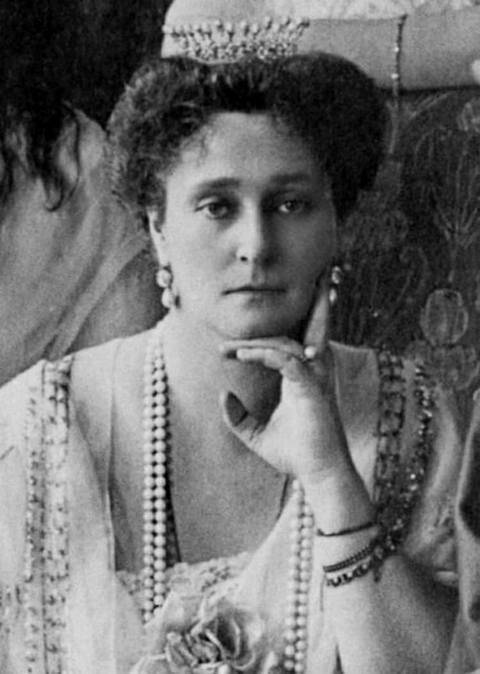
Empress Alexandra Feodorovna did not complain about almost any of the royal ministers
However, both Izvolsky and Alexandra Fedorovna and her spouse did not take into account that the head of the Russian Foreign Ministry was not at all seduced by the dubious glory of the “liberator of Poland”, and after her, obviously, Finland. He played the Polish card so energetically, first of all in order to bargain as much as possible for Russia after the victory, which few people doubted then. Nevertheless, giving instructions to Izvolsky on the eve of the conference in Chantilly, Sazonov did not fail to remind him again that the Polish question was an internal question for the Russian Empire. Internal question!
From the telegram of the Ministry of Foreign Affairs to the ambassador in Paris dated February 24 / 8 in March 1916 in Paris:
It is necessary especially to insist on the exclusion of the Polish question from the subjects of international discussion and on the elimination of any attempts to put the future of Poland under the guarantee and control of the powers (5).
* American aid plans for occupied Poland were primarily coordinated with England. There were no objections, but the English put forward two conditions: a) England should not provide any financial subsidies; b) there will be sufficient guarantees against Germany not buying up fatty products intended for the Polish and Russian population.
It is characteristic that England, not the USA, set a condition for the project to be approved by the Russian government.
Notes
1. International relations in the era of imperialism. Documents from the archives of the royal and provisional governments 1878-1917. M.1935, Series III, Volume VIII, Part 2, p.18-20.
2. Golovin N.N. Russia's military efforts in the First World War, M., 2001 g., P. 150-152, 157-158.
3. International relations in the era of imperialism. Documents from the archives of the royal and provisional governments 1878-1917. M.1938, Series III, Volume X, p.343-345.
4. Ibid., Series III, volume X, p. 113-114.
5. Ibid., Series III, volume X, p. 351.
Information